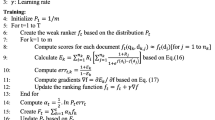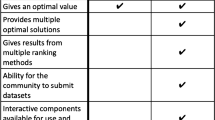Abstract
We are interested in supervised ranking with the following twist: our goal is to design algorithms that perform especially well near the top of the ranked list, and are only required to perform sufficiently well on the rest of the list. Towards this goal, we provide a general form of convex objective that gives high-scoring examples more importance. This “push” near the top of the list can be chosen to be arbitrarily large or small. We choose ℓ p -norms to provide a specific type of push; as p becomes large, the algorithm concentrates harder near the top of the list. We derive a generalization bound based on the p-norm objective. We then derive a corresponding boosting-style algorithm, and illustrate the usefulness of the algorithm through experiments on UCI data. We prove that the minimizer of the objective is unique in a specific sense.
Preview
Unable to display preview. Download preview PDF.
Similar content being viewed by others
References
Agarwal, S., Graepel, T., Herbich, R., Har-Peled, S., Roth, D.: Generalization bounds for the area under the ROC curve. Journal of Machine Learning Research 6, 393–425 (2005)
Clemençon, S., Lugosi, G., Vayatis, N.: Ranking and scoring using empirical risk minimization. In: Proceedings of the Eighteenth Annual Conference on Computational Learning Theory (2005)
Collins, M., Schapire, R.E., Singer, Y.: Logistic regression, AdaBoost and Bregman distances. Machine Learning 48(1/2/3) (2002)
Cortes, C., Mohri, M.: AUC optimization vs. error rate minimization. In: Advances in Neural Information Processing Systems 16 (2004)
Cucker, F., Smale, S.: On the mathematical foundations of learning. Bull. Amer. Math. Soc. 39, 1–49 (2002)
Dekel, O., Manning, C., Singer, Y.: Log-linear models for label ranking. In: Advances in Neural Information Processing Systems 16 (2004)
Pietra, S.D., Pietra, V.D., Lafferty, J.: Duality and auxiliary functions for Bregman distances. Technical Report CMU-CS-01-109R, School of Computer Science, Carnegie Mellon University (2002)
Freund, Y., Iyer, R., Schapire, R.E., Singer, Y.: An efficient boosting algorithm for combining preferences. Journal of Machine Learning Research 4, 933–969 (2003)
Freund, Y., Schapire, R.E.: A decision-theoretic generalization of on-line learning and an application to boosting. Journal of Computer and System Sciences 55(1), 119–139 (1997)
Koltchinskii, V., Panchenko, D.: Empirical margin distributions and bounding the generalization error of combined classifiers. The Annals of Statistics 30(1) (February 2002)
Mozer, M.C., Dodier, R., Colagrosso, M.D., Guerra-Salcedo, C., Wolniewicz, R.: Prodding the ROC curve: Constrained optimization of classifier performance. In: Advances in Neural Information Processing Systems 14, pp. 1409–1415 (2002)
Rudin, C.: Ranking with a p-norm push. Technical Report TR2005-874, New York University (2005)
Rudin, C., Cortes, C., Mohri, M., Schapire, R.E.: Margin-based ranking meets boosting in the middle. In: Proceedings of the Eighteenth Annual Conference on Computational Learning Theory (2005)
Rudin, C., Schapire, R.E.: Margin-based ranking and why Adaboost is actually a ranking algorithm (in progress, 2006)
Blake, C.L., Hettich, S., Merz, C.J.: UCI repository of machine learning databases (1998)
Usunier, N., Amini, M.-R., Gallinari, P.: A data-dependent generalisation error bound for the AUC. In: Proceedings of the ICML 2005 Workshop on ROC Analysis in Machine Learning (2005)
Yan, L., Dodier, R.H., Mozer, M., Wolniewicz, R.H.: Optimizing classifier performance via an approximation to the Wilcoxon-Mann-Whitney statistic. In: Proc. ICML, pp. 848–855 (2003)
Author information
Authors and Affiliations
Editor information
Editors and Affiliations
Rights and permissions
Copyright information
© 2006 Springer-Verlag Berlin Heidelberg
About this paper
Cite this paper
Rudin, C. (2006). Ranking with a P-Norm Push. In: Lugosi, G., Simon, H.U. (eds) Learning Theory. COLT 2006. Lecture Notes in Computer Science(), vol 4005. Springer, Berlin, Heidelberg. https://doi.org/10.1007/11776420_43
Download citation
DOI: https://doi.org/10.1007/11776420_43
Publisher Name: Springer, Berlin, Heidelberg
Print ISBN: 978-3-540-35294-5
Online ISBN: 978-3-540-35296-9
eBook Packages: Computer ScienceComputer Science (R0)




